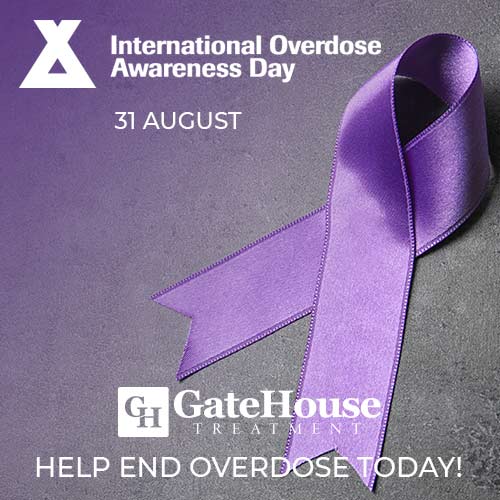
International Overdose Awareness Day, held every year on August 31, is a global event to raise awareness that overdose death is preventable and to reduce the stigma associated with drug-related death. International Overdose Awareness Day also serves as an opportunity to remember loved ones lost to overdose. The campaign is coordinated by the Penington Institute, an Australian organization dedicated to harm reduction and preventing overdose death.
According to the UN Office on Drugs and Crime’s most recent World Annual Drug Report, 585,000 people around the world died as a result of drug use in 2017.
North America continues to experience the highest drug-related mortality rate in the world, accounting for one in every four drug-related deaths worldwide. According to the Centers for Disease Control, more than 67,000 people died from drug overdoses in 2018, making it a leading cause of injury-related death in the United States.
The Colors of International Overdose Awareness Day
The silver badge, purple wristband and purple lanyard are symbols of awareness of overdose and its effects. Wearing these signifies the loss of someone you loved due to an overdose or demonstrates support to those experiencing grief. It sends out a message that every person’s life is valuable and that stigmatizing people who use drugs needs to stop.
What Is an Overdose?
An overdose means having more of a drug (or combination of drugs) than your body can handle. There are many signs and symptoms of an overdose, which differ with the type of drug used. All drugs can cause an overdose, including prescription medication prescribed by a doctor. It is essential to know the right amount and the right time to take your medication. It is also vital to know what drugs should not be mixed and to get help if you feel you are not in control of your drug use.
When people talk about overdoses, we tend to think in terms of opioid abuse. However, we must be mindful of the fact that you can overdose on any drug, including:
- Alcohol
- New Psychoactive Substances (NPS) and synthetic drugs like fentanyl
- Depressants—benzodiazepines like Xanax and barbiturates
- Stimulants— amphetamines, crystal meth, cocaine and MDMA aka Ecstasy
International Overdose Awareness Day Events
In 2019, there were 874 global events held in 39 countries. Entire communities, families and friends came together to raise awareness of one of the world’s most urgent public health crises – one that, unfortunately, is only getting worse.
A full list of the IOAD 2020 event currently planned around the world is on the Overdose Awareness Day website.
GateHouse on Overdoses
Coronavirus has only made the overdose crisis around the world. Overdoses increased nationally by 18 percent in March, 29 percent in April and 42 percent in May. Read our article, “Pandemic and Opioid Epidemic Combine for Deadly Results,” for more on the topic.
The prescribing guidelines for opioid drugs have often been too lenient, meaning that some doctors prescribe them even when it is irresponsible and potentially harmful.
“No family should ever have to go through the pain of losing a loved one because of overdose, said GateHouse Chief Science Officer Dr. Samuel MacMaster. “Overdose can affect anybody and one of the messages of this day is that the people who overdose are our sons, daughters, mothers, fathers, brothers and sisters – they are loved and they are missed.”
First Aid for Drug Overdose
A wide variety of signs and symptoms can occur when someone overdoses, and everyone responds differently. Signs and symptoms depend on factors including which drug is taken, the amount taken and the person’s health at the time of the drug overdose.
An overdose is a medical emergency that requires immediate medical attention. If you can’t get a response from someone, do not assume they are asleep. Sometimes it can take hours for someone who has overdosed to die. Always call an ambulance if you suspect someone has overdosed.
People are often reluctant to call an ambulance for fear of police involvement or concern about the cost. However, you should always call an ambulance if you suspect someone is at risk of overdose. In many places, the police will only attend if there is a fatality or other circumstances warranting police attendance, such as a threat to the ambulance crew.
Seeking emergency help isn’t just for when someone is unconscious. You should also seek emergency help when someone is experiencing:
- Seizure
- Chest pain
- Breathing difficulties
- Episodes of paranoia, agitation or confusion
You don’t have to have all of these signs or symptoms for them to be overdosing. Exhibiting one or two could still mean mean trouble and require emergency help.
Get Help Before Overdose Becomes a Reality
For the people still struggling with alcohol or drug addiction, there is help available. Call GateHouse Treatment today at (855) 448-3638; you can heal and live a life of sobriety, we can help.
- Cymbalta Withdrawal: Causes, Symptoms, And Management - October 12, 2023
- Boredom in Recovery: 5 Tips to Avoid Relapse - October 6, 2023
- Overconfidence and Rehab: Avoiding Relapse - October 4, 2023




